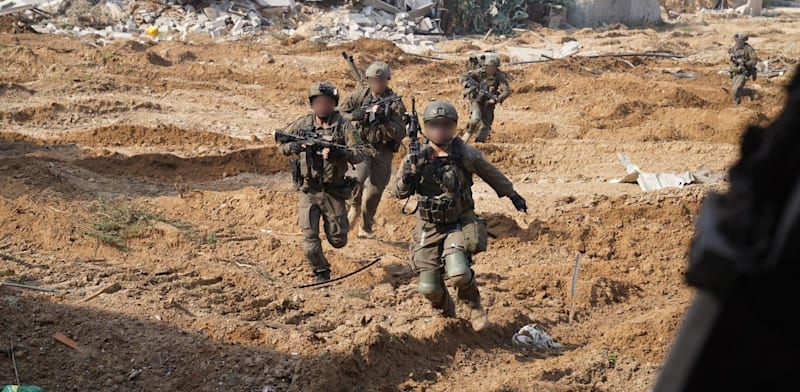Int’l Court of Justice ruling could limit IDF operations


Israel will appear next week before the International Court of Justice (ICJ) at the Hague to contest South Africa’s accusations of war crimes and genocide in the Gaza Strip. Israel is concerned that the ICJ will issue an order that would limit the IDF’s activity in the Gaza Strip in the war against Hamas. Following the accusations Israel’s Ministry of Foreign Affairs, the IDF and Ministry of Justice held discussions on how to proceed and last night in discussions headed by Prime Minister Benjamin Netanyahu, it was decided that Israel would participate in the ICJ hearing, which begins next week.
South Africa filed charges against Israel with the ICJ last week for its alleged indiscriminate use of power and forcibly expelling residents from their homes. In a detailed complaint, South Africa cites the harm caused to Gaza’s residents including 21,000 killed. The charges refer to reports by the World Health Organization on the dangers of starvation and IDF operations focusing on civilian centers including courts, museums and mosques. South Africa has asked the court to urgently issue an interim order to Israel ordering it to stop military operations in the Gaza Strip.
The danger confronting Israel is that the court will issue such an order that will limit its activities in the Gaza Strip in the fight against Hamas. The court does not impose sanctions, but may turn to the UN Security Council to request enforcement. However, in the UN Security Council, the US has a right of veto, in contrast to its power in the ICJ, where it has one of 15 judges.
A significant event with negative consequences for Israel
Adv. Roy Schondorf, a former deputy legal advisor to the Israeli government on international law, and currently head of International Dispute Resolution at the Herzog law firm told “Globes,” “This development should be taken very seriously. It is a significant event, which may have negative consequences for the State of Israel. Orders and rulings of the court are binding. In the most serious scenario, where the court will issue temporary orders against the State of Israel in the near future, this may have consequences on the political level, including in very practical matters. For example, this may affect decisions by countries on whether to allow the sale of weapons to the State of Israel. I am also very concerned this could reflect on other legal courts, such as the criminal investigation that is already underway at the International Criminal Court in The Hague. I very much hope that the court will refrain from issuing temporary orders. There is an excellent legal team in the public service of the State of Israel, but procedures of this type are not always decided only by legal considerations.”
“It is important to understand that the court has the authority to intervene in real time, and therefore the event is more significant than it has been to date,” says attorney Yuval Kaplinsky, former director of the international department at the State Attorney’s Office currently at the Fisher law firm. “This is the reason, in my opinion, that they have decided to cooperate now. The court can, for example, issue a temporary order for the IDF to withdraw its forces from Gaza.” Kaplinsky explains that Israel’s challenge now, as much as it wishes to continue fighting freely, is to “extend the procedure to allow Israel time to act, and continue to act so that an operative order will not be issued. Any order that would be handed down would acknowledge that the court is convinced that Israel is committing war crimes.”
Chapter detailing statements by Israeli officials
South Africa’s charges come after senior officials spoke publicly about the military activity against the backdrop of international criticism of the harm to civilians in the Gaza Strip. The written complaint includes a chapter detailing statements by Israeli officials including the prime minister, senior ministers, MKs and IDF officers. The statements imply an intention to take revenge and harm Gaza and its residents: the mention of the biblical verse “Remember what Amalek did to you,” “We will deal Gaza a blow, which has not been seen for 50 years,” and a video of soldiers singing, “Wipe out the memory of Amalek. No Gazans are not involved.”
Military Advocate General Maj. Gen. Yifat Tomer-Yerushalmi, presented the prosecution’s arguments to Chief of Staff Herzi Halevi and the General Staff Forum including the large number of casualties in Gaza, the extensive destruction, at the same time as quotes in the media about the nature of the operations in the Gaza Strip.
She said, “The statements are to be regretted. It would have been better if some of these statements had not been said and they do not reflect the true policy of the State of Israel and the state of things.”
According to Kaplinsky, the biggest problem is the number of Gazans killed and the comments by Israelis presented in the charges. “The large accumulation of so many statements and the silence of officials makes me concerned.
“The Chief of Staff’s statement that the IDF doesn’t shoot people who have surrendered is almost unique, and there haven’t been many statements like that. There hasn’t been enough exposure for it. It’s not enough to say that we are the most moral army. We need to show statements that clarify what the real intentions are and express a position on the unwanted deaths.”
The International Court of Justice has two roles: to decide disputes and to give an opinion at the request of the UN. The court is made up of 15 judges from countries including the US, China, Russia, Lebanon and Japan. Israel and South Africa are members of the Convention on the Prevention of Genocide, which confers jurisdiction on the tribunal. Therefore, on the face of it, Israel is not expected to claim a lack of the court’s authority over it.
Israel appeared in the court in the 1950s when it sued for a downed plane. In 2004, in an opinion at the request of the UN, the court ruled that the separation wall is contrary to international law and called for the construction to be stopped and the parts built beyond the Green Line to be dismantled. Israel disputed the authority of the court on an internal Israeli issue and did not participate in the discussion. At the end of 2022, the UN General Assembly requested an opinion on the Israeli occupation of the West Bank and East Jerusalem. Israel submitted a written position in the procedure and an oral hearing is scheduled for February 2024.
“Israel is bound by international law and acts according to it”
A spokesperson for the Ministry of Foreign Affairs said, “Israel rejects with disgust the blood libel by South Africa. Its claim lacks a factual and legal basis and constitutes a vile and cheap exploitation of the court. South Africa cooperates with a terrorist organization that calls for the destruction of the State of Israel. The terrorist organization Hamas, which commits war crimes, crimes against humanity and tried to commit genocide on October 7, is responsible for the suffering of the Palestinians in the Gaza Strip, by using them as human shields and stealing humanitarian aid from them. ,
“Israel is bound by international law and acts according to it, and directs its military efforts against the terrorist organization Hamas and the terrorist organizations cooperating with it and only against them. Israel has made it clear that the residents of the Gaza Strip are not the enemy and is making efforts to reduce harm to those not involved and to allow humanitarian aid to enter the Strip. “We call on the International Court of Justice and the international community to reject outright South Africa’s baseless claims.”
Published by Globes, Israel business news – en.globes.co.il – on January 2, 2024.
© Copyright of Globes Publisher Itonut (1983) Ltd., 2024.








